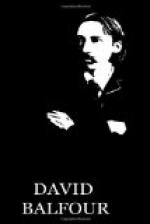“Who are these two, mother?” I asked, and pointed to the corpses.
“A blessing on your precious face!” she cried. “Twa joes[7] o’ mine: just twa o’ my old joes, my hinny dear.”
“What did they suffer for?” I asked.
“Ou, just for the guid cause,” said she. “Aften I spaed to them the way that it would end. Twa shillin’ Scots; no pickle mair; and there are twa bonny callants hingin’ for ’t! They took it frae a wean[8] belanged to Brouchton.”
“Ay!” said I to myself, and not to the daft limmer, “and did they come to such a figure for so poor a business? This is to lose all indeed.”
“Gie’s your loof,[9] hinny,” says she, “and let me spae your weird to ye.”
“No, mother,” said I, “I see far enough the way I am. It’s an unco thing to see too far in front.”
“I read it in your bree,” she said. “There’s a bonnie lassie that has bricht een, and there’s a wee man in a braw coat, and a big man in a pouthered wig, and there’s the shadow of the wuddy,[10] joe, that lies braid across your path. Gie’s your loof, hinny, and let Auld Merren spae it to ye bonny.”
The two chance shots that seemed to point at Alan and the daughter of James More, struck me hard; and I fled from the eldritch creature, casting her a baubee, which she continued to sit and play with under the moving shadows of the hanged.
My way down the causeway of Leith Walk would have been more pleasant to me but for this encounter. The old rampart ran among fields, the like of them I had never seen for artfulness of agriculture; I was pleased, besides, to be so far in the still countryside; but the shackles of the gibbet clattered in my head; and the mops and mows of the old witch, and the thought of the dead men, hag-rode my spirits. To hang on a gallows, that seemed a hard case; and whether a man came to hang there for two shillings Scots, or (as Mr. Stewart had it) from the sense of duty, once he was tarred and shackled and hung up, the difference seemed small. There might David Balfour hang, and other lads pass on their errands and think light of him; and old daft limmers sit at leg-foot and spae their fortunes; and the clean genty maids go by, and look to the other side, and hold a nose. I saw them plain, and they had grey eyes, and their screens upon their heads were of the Drummond colours.
I was thus in the poorest of spirits, though still pretty resolved, when I came in view of Pilrig, a pleasant gabled house set by the walkside among some brave young woods. The laird’s horse was standing saddled at the door as I came up, but himself was in the study, where he received me in the midst of learned works and musical instruments, for he was not only a deep philosopher but much of a musician. He greeted me at first pretty well, and when he had read Rankeillor’s letter, placed himself obligingly at my disposal.
“And what is it, cousin David?” says he—“since it appears that we are cousins—what is this that I can do for you? A word to Prestongrange? Doubtless that is easily given. But what should be the word?”




